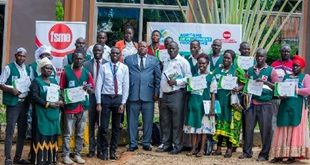
But only a small proportion of the region’s population is hooked to the internet
Kampala, Uganda | RONALD MUSOKE | Sub-Saharan African economies are sluggishly growing owing to global uncertainty, poor management of debt, inflation as well as political and regulatory uncertainty, according to the latest World Bank’s bi-annual analysis of the state of African economies.
Most of the economies in the sub-region also remain fragile but, embracing the ‘digital economy’ fundamentals could help uplift their fortunes, senior World Bank officials said.
“The digital economy will create more jobs, encourage entrepreneurship for youth, raise productivity of farmers, bring more women into the labour force, and create new markets—all of which boosts growth,” the World Bank report known as ‘Africa’s Pulse’ released on April 08, reads in part.
“This is a game changer for Africa,” said Albert Zeufack, the World Bank Chief Economist for Africa. Zeufack said digital transformation could increase growth by nearly two percentage points per year in sub-Saharan Africa alone.
The transition to a digital economy would not only provide a platform to boost agricultural productivity and modernize the rural economy but would also serve as a tool that accelerates the process of structural transformation from agriculture to digital-enhanced, manufacturing and/or information and communication technology (ICT) based services.
The latest report downgraded economic growth in sub-Saharan Africa to 2.3% for 2018, down from 2.5% in 2017, thanks to a population boom that is growing faster than the economies. The World Bank said this scenario has played out for the fourth consecutive year and, although regional growth is expected to rebound to 2.8% in 2019, it will have remained below 3% since 2015.
Mediocre economic performance
The World Bank said several countries in the sub-region had recorded mixed economic growths during the period under review, citing a slowdown in economic activity in advanced economies, emerging markets and developing economies and, global uncertainty related to trade disputes between the United States and China.
In Nigeria, for instance, growth reached 1.9% in 2018, up from 0.8% in 2017, reflecting a modest pick-up in the non-oil economy. South Africa, on the other hand, came out of recession in the third quarter of 2018, but growth was subdued at 0.8% over the year, as policy uncertainty held back investment. Angola, the region’s third largest economy, remained in recession, with growth falling sharply as oil production remained weak.
But growth picked up in some resource-intensive-countries like the Democratic Republic of Congo and Niger, as stronger mining production and commodity prices boosted activity alongside a rebound in agricultural production and public investment in infrastructure.
In other countries such as Liberia and Zambia, growth was subdued, as high inflation and high debt levels continued to weigh on investor sentiment.
Interestingly, non-resource intensive economies such as Kenya, Rwanda, and Uganda in eastern Africa as well as Benin and Ivory Coast in West Africa recorded solid economic growth in 2018.
Fragile economies
Still, the World Bank says fragility in several countries is costing the entire continent over half a percentage point of growth per year which actually translates into 2.6 percentage points over five years.
Fragility has not only kept African countries from creating jobs and reducing poverty as quickly as possible, it has also come at a cost in terms of social cohesion and the social contract between citizens and the governments.
The World Bank says this is not just an economic issue. In order to escape this situation, the World Bank says most economies need to emulate Ethiopia and Rwanda, two of the fastest growing economies on the continent.
“There are lessons to be learned from these countries. They improved their policy environment, strengthened their institutions, and strengthened state capacity to deliver services to their people.”
 The Independent Uganda: You get the Truth we Pay the Price
The Independent Uganda: You get the Truth we Pay the Price


